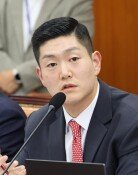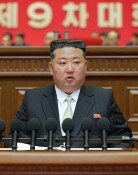Complexity Surrounds Ratification of FTA With U.S.
Complexity Surrounds Ratification of FTA With U.S.
Posted May. 26, 2008 07:52,
▽ Different interpretations of Obamas letter
The presidential office of Cheong Wa Dae spent a busy day yesterday assessing the public opposition of leading U.S. presidential contender Barack Obama to the free trade agreement between Korea and the United States.
A senior presidential official in Seoul said, Sen. Obamas opposition rebuts the allegation that the free agreement is biased against our country, adding Obamas letter will boost momentum for the agreements ratification in Korea.
Ahn Sang-soo, the outgoing floor leader of the ruling Grand National Party (GNP), said, When the U.S. presidential election starts, candidates cannot endorse the agreement. They are sensitive about what voters want. Aware of the problem, President Bush is pressing ahead with the ratification before the race begins. To facilitate the process, we have to ratify it first, and this is in the best interests of both countries.
Urging a fast track process of the deal in an interim session, Ahn said, An earlier ratification on our part will put pressure on the U.S. Congress, and that will work it out before the election.
Hong Joon-pyo, who will succeed Ahn as floor leader, added, Obamas letter actually clarified one thing for us. He defined it as an unequal agreement, and what it proves is that the agreement is tipped toward us. We ought to move fast and thus pressure members of Congress.
What the GNP contends is translated as follows: By passing the agreement, Korea honors its integrity as a friend of the United States, but if Washington fails to honor its promise, it will damage bilateral trust.
On the other hand, the main opposition United Democratic Party (UDP) demanded a prudent strategic choice. Party spokeswoman Cha Young said any action by Seoul could put Koreas back to the wall, stripping it of options it could employ in the event of a renegotiation.
▽ Continuing battle in the May session
The GNP says the situation is beginning to turn in its favor. According to the party, Obamas letter, the failed opposition bid to oust the Korean agriculture minister, and President Lee Myung-baks public address have mustered enough consensus and momentum for ratification. The ruling party reportedly will push the opposition hard for the deal in the last interim session of the 17th National Assembly starting today.
Ahn told The Dong-A Ilbo yesterday in a phone interview, I think I will speak to [UDP] floor leader Kim [Hyo-seok] tomorrow. Our party leader Kang [Jae-sup] is also planning talks with UDP leader Sohn [Hak-kyu]. We intend to ratify the agreement prior to the last day of the 17th National Assembly, which is Thursday. We are talking to them through all channels.
The opposition party would not talk with us. Sure, its tough. But in politics, results often come out at the last minute.
Hong backed Ahns statements, saying, If the opposition party tries to take the vantage point with the FTA initiative in organizing committees of the 17th parliament, we will let them do it over our dead bodies.
Should ratification of the agreement come in the last interim session, the GNP leadership says the party will earn enough time to urge members of the U.S. Congress pass the deal as well.
On the contrary, the main opposition UDP does not want to take the heat that could arise from ratification. The party fears it could be held jointly liable for the expected damage to certain industries, thus it will not budge until the GNP-dominated 18th National Assembly begins.
Parliamentary speaker Lim Chae-jung is also unlikely to allow a vote on the deals ratification in a full parliamentary session, as requested by the GNP. Thus, unless the UDP cooperates, ratification is highly unlikely.
Given the complexity, most politicians see July as the practical deadline for ratification since lawmakers will leave Washington for the summer break. The upcoming presidential election will also leave the agreement idle thereafter.
Therefore, Plan B for the GNP is to pass the agreement in an interim session of the 18th National Assembly. But the parties are deadlocked over how to organize the committees of the next parliament. They are playing a tug-of-war to win more committee chairmanships. History shows June is not the month for bipartisan action.
If the parties agree on organizational details and an interim session is convened in June, the GNP plans to move swiftly to ratify the agreement. In pure numbers, the party can pass the agreement to be put up for vote by the next speaker despite UDP opposition.
But the unilateral move in the first interim session will arouse heavy criticism and protest from the other side. Filibustering tactics such as public hearings could drag the passage beyond June.
Failure to reach an agreement on parliamentary composition could delay ratification to July or August, casting a more dismal future for the deal.
Belated passage leaves little time for lobbying the U.S. Congress for ratification, raising another argument for passage in the regular session in September.
Moreover, the U.S. Democratic Party is openly expressing hostility toward the agreement. Washingtons free trade deal with Columbia is in limbo without any signs of passage. Furthermore, Obamas voice is getting harsher on the accord, making it much tougher for the Bush administration to introduce the agreement to Congress.
A worse scenario is if Obama wins in November, since that might kill the agreement itself. To consummate the deal against all odds, the Bush administration must ratify it by September and Korea by July or August by convening a parliamentary interim session.
A senior presidential office in Seoul said on the condition of anonymity, If we pass the agreement within the desirable time frame, the Bush administration will have a 50-50 chance of ratification. If we fail, the odds drop to 20 percent.







